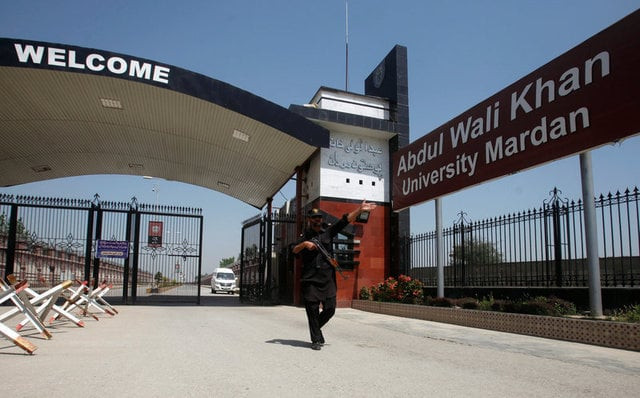Heads of varsities discuss ways to end intolerance, radicalisation in higher education
Heads of 60 universities discuss growing cases of violence and intolerance at higher education institutions

A policeman gestures as he stands guard at the entry of Abdul Wali Khan University where Mashal Khan, accused of blasphemy, was killed by a mob, in Mardan on April 14, 2017. PHOTO: REUTERS
The universities’ heads had gathered for a daylong seminar organised by the Higher Education Commission (HEC) on Monday to discuss growing cases of violence and intolerance in the country’s universities.
The seminar was held in the aftermath of the last month’s lynching of Mashal Khan, a student of Abdul Wali Khan University in Mardan. A first of its kind at the national level, the seminar deliberated upon the ways for universities to become agents of positive change.
HEC calls meeting to discuss campus violence
HEC Chairman Dr Mukhtar Ahmed announced on the occasion that a second such meeting might take place at the General Headquarters on May 18 under the chairmanship of Army Chief General Qamar Bajwa.
Talking to The Express Tribune, the Fatima Jinnah Women University Rawalpindi VC said, “The problem has taken time to surge and will take a while to erode.”
During the conference, VC of the Liaquat University of Medical Health Sciences Dr Noshad A Shaikh shared Noreen Laghari’s story, a student who was recruited by Da’ish through social media.
Call for researchers: Pakistan ‘in need of’ 36,000 PhDs
Commenting on the meeting and the issue, Rector of the International Islamic University Islamabad Masoom Yasinzai said the VCs had agreed that it was time to make higher education institutes relevant to the needs of society.
During the seminar, more than a dozen VCs also talked about social media abuses and how it was ‘ruining the lives of youth and destroying families’.
“We are losing our morals, values and basic principles with the invasion of new technology,” commented a VC from Lahore.
VCs appointment case: CCI’s role in education standards draws mixed reaction
The conference was also addressed by Minister for Federal Education and Professional Training Balighur Rehman, who called for sensitising teachers on the significance of the subject, and not just teaching ethics.
He also revealed that the draft of the new National Education Policy is in the final stages and would be open for public comments soon.
Earlier in his inaugural address, HEC chief Mukhtar Ahmed emphasised the need for universities’ leadership to take practical steps for addressing intolerance.
Safety at varsities: Official report defines 34 points for peaceful campuses
“You will always find them [students] responsive if you provide them opportunities for mental and physical grooming. Talk to them, discuss their challenges and problems and you will see they will not only listen to you but take your advice in their life’s decisions also,” he said.
During the daylong seminar, the VCs were divided into five groups with five topics for discussion and recommendations. The topics included role of the faculty in cubing extremism; role of students in developing tolerance; role of university leaders and administrators in ensuring harmony and eliminating radicalisation; policy support for curbing extremism; and curbing extremism through curriculum.
Recommendations
During the course of the conference, the participants agreed that faculty members should be sensitised to interact with students more frequently to address the disconnect they have between them.
They also agreed that capacity building of teachers should start right from their appointment, and that a mechanism should be streamlined for the mentoring and counselling of students.
Futures at stake: VU enrolls 4,500 students without NoC
The participants were unanimous that student societies should be made functional to involve students in more and more co-curricular activities to utilise their potential in a positive way.
They all said yes to holding lectures at campuses on various social topics by renowned scholars and experts so that students have the opportunity to listen to different views.


















COMMENTS
Comments are moderated and generally will be posted if they are on-topic and not abusive.
For more information, please see our Comments FAQ